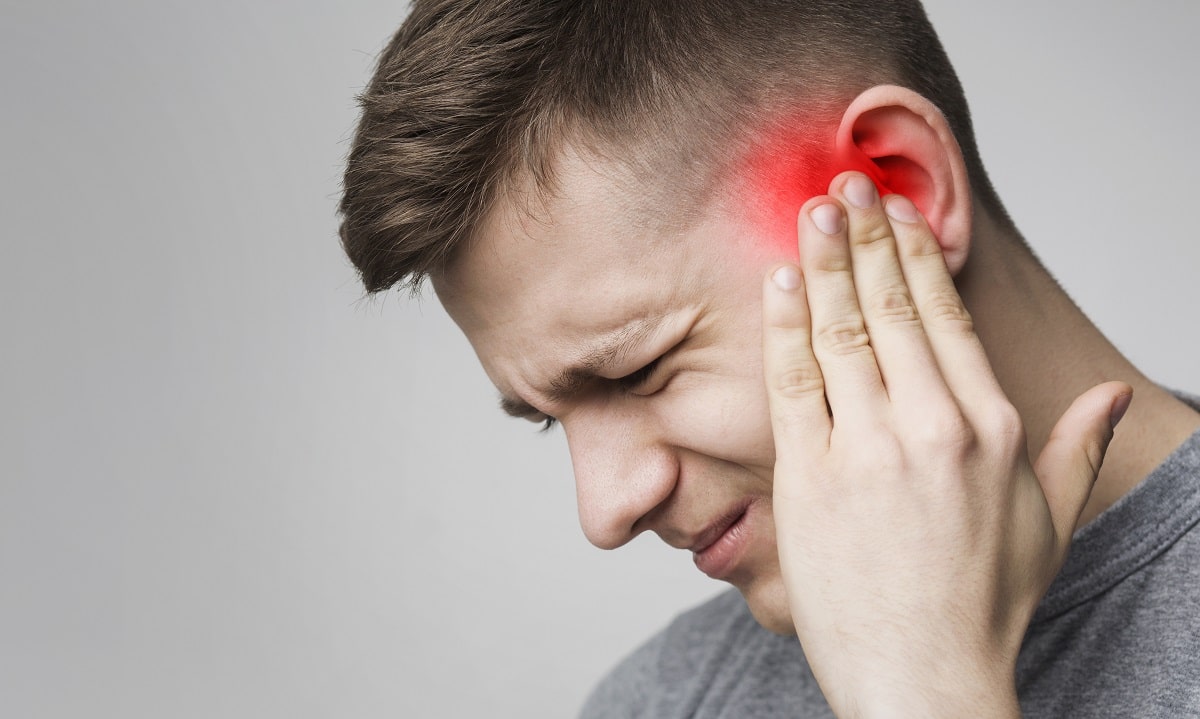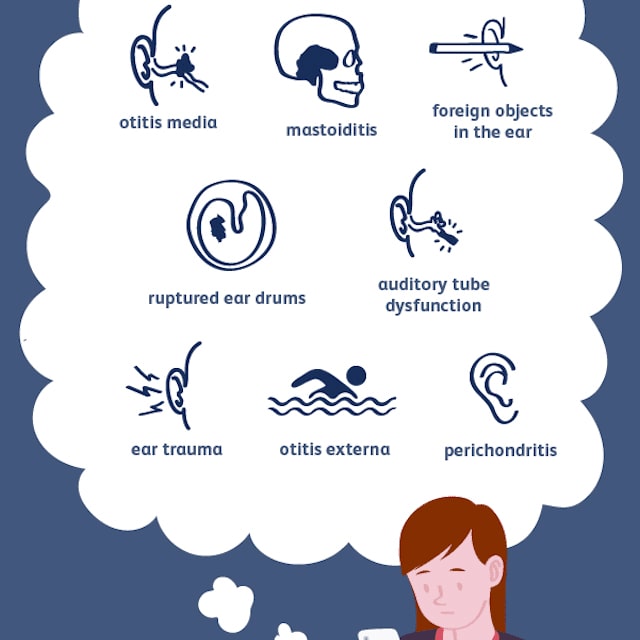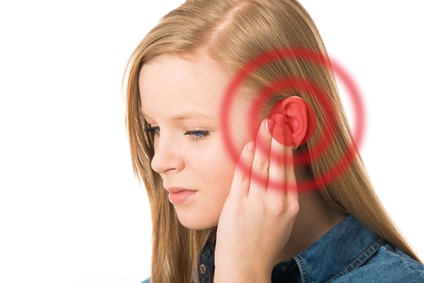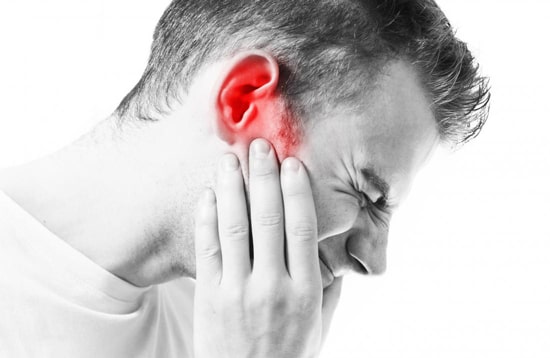WHAT IS EAR PAIN?
Ear pain bothers everyone at some point or the other. Most people consider it to be a common problem and that is why they want to solve it with simple home remedies.
But, neglecting ear pain can prove to be harmful as it can become a serious problem and it affects about 7.6 percent of people.
Along with this, since most people do not get its treatment at the right time, due to this they also become victims of deafness.
In such a situation, it is necessary that people should be given complete information about ear pain so that they can protect themselves from it and get it treated properly.
In view of this seriousness, let us try to get information about this ear problem through this article.

ALL YOU NEED TO KNOW ABOUT EAR PAIN
Ear pain is also known as an earache. It refers to pain that starts in the ear, but over time, this earache gets worse and can lead to swelling of the throat from the temporomandibular joint syndrome.
In such a situation, a person may need medical help and if for some reason this help is not available in time, then it can also cause the person to lose his hearing.
WHAT ARE THE SYMPTOMS OF THE EARACHE?
Like any other disease, earache also has its own symptoms, which indicate its onset.
Therefore, if a person sees these 5 symptoms, then he should be alert because they can become the cause of serious illness-
- Severe pain in the ear– This is the main symptom of earache, in which there is severe pain in the ear of the person. Because of this, he also becomes unconscious for some time, and for this, he needs to rest.
- Feeling of heaviness in the ear– Often, it has also been seen that some people feel heaviness in the ear, due to which they have to face a lot of trouble.
- Nausea– Generally, nausea is not taken seriously and it is also believed that this problem will get better on its own after some time. However, in some cases, such as nausea in the ear, it can cause serious problems.
- Hearing loss- When a person has ear pain for a long time, then it affects his hearing power, that is, hearing ability, then he gradually results in the problem of hearing loss. Therefore, if a person is suffering from such a problem, then he has to inform his doctor immediately
- Discharge leaking from the ear– Sometimes it has also been seen that due to ear problems, some people feel that there is some discharge coming out of their ear.

WHY DOES EARACHE HAPPEN?
It is believed that any disease occurs due to certain reasons, if a person is aware of those reasons, then he can stop this ear disease from progressing.
This also applies to earache and for this reason any person can prevent earache by identifying the following reasons-
- Dust accumulation in the ear– It is said that every person should take special care of his body and should clean all his parts, this also applies to the ear. Similarly, if a person does not clean his ear from time to time, then due to this, dirt can accumulate in his ear, which can cause many problems.
- Boils in the ear– Often, earache can also be due to ear pimples or boils. Therefore, if a person has a boil in the ear, then he should get it treated immediately because it can cause a serious problem.
- Drops of shampoo or water in the ear– When a person gets shampoo or water in the ear, it can cause pain in the ear. Although this problem resolves on its own after some time, if it continues for a long time, it can cause tearing of the eardrum.
- Sinus infection– Ear pain can also happen to people who suffer from sinus. For this reason, such people should take special care of their health and should contact the doctor in case of any kind of problem.
- Sore Throat– Earache can also occur when a person has a sore throat. Usually, such a cold is also due to, but sometimes it can cause ear pain.
- Having problems in the eardrum– If a person has any problem related to the eardrum such as a hole in the eardrum, swelling of the eardrum, etc., then he is more likely to have ear pain. Therefore, any person should get the problem of eardrums treated properly.
EAR PAIN TREATMENTS
How to cure earache? This question is important for all such people who suffer from earache.
A person suffering from ear pain has to face many problems. In such a situation,looking for ways through which he can get rid of this ear problem can help.
If a person is troubled by ear pain, then he can get rid of this ear problem with these 5 methods of treatment-
- Adopting home remedies– The easiest way to get rid of ear pain is to adopt home remedies. A person suffering from ear pain can get rid of ear problems by using olive oil.
- Ear drops- In general, earache can be relieved through ear drops. For this reason, ear pain can also be relieved through ear drops or ear drops.
- Taking antibiotics– Many times, it has been found that most people get ear ache due to some kind of infection. Therefore, if a person takes antibiotics, then he can reduce the chances of ear pain.
- Surgery- If a person has ear pain due to a problem with the eardrum, then in that case doctors resort to surgery. In this situation, tympanoplasty surgery is done, in which the eardrum is fixed.

TYMPANOPLASTY SURGERY
As explained above, tympanoplasty surgery is the best way to treat ear problems.
Whenever a doctor recommends a person to undergo tympanoplasty surgery, then in that case the question that comes to mind of that person is that how much does this ear surgery cost.
This question is of great importance to him as it affects his economic stability. It may be that most people consider this ear surgery to be an expensive procedure and that is why they are not able to take advantage of it.
But, tympanoplasty surgery is an economical procedure to get rid of the ear problem.
WHAT ARE THE RISKS OF TYMPANOPLASTY SURGERY?
Although tympanoplasty surgery is a beneficial surgery that can be helpful in diagnosing ear problems, this ear surgery, like any other procedure, has some risks that are important to be aware of.
If a person has recently undergone tympanoplasty surgery or is planning to have it in the future, then he has to face the following risks-
- Narrowing of the ear canal– Many times it has been seen that after doing this ear surgery, the ear canal shrinks, and in that case, another surgery is needed.
- Perforation in the eardrum– Although tympanoplasty surgery is performed to correct the problem of the eardrum, sometimes this problem can remain unresolved. For this reason, medical help may be needed.
- Deterioration of facial muscles– Since, this surgery is related to the ear, in such a situation, its deterioration can have an effect on the entire face. For this reason, the facial muscles can get damaged, due to which the person does not know the taste of anything.
- Evolution of the skin behind the eardrum- It has been seen many times that due to the failure of this ear surgery, the skin behind the eardrum of the person undergoing it develops abnormally. This problem is called cholesteatoma in the medical language.
- Loss of hearing- This is the most serious risk of ear surgery, in which a person loses his hearing and in that case, he has to spend his whole life like this.
PRECAUTIONS AFTER TYMPANOPLASTY
Although this ear surgery can have risks, these risks can be reduced by taking certain precautions.
Therefore, if a person has recently undergone tympanoplasty surgery, then he must take these 5 precautions as it can play a decisive role in the recovery of that person-
- Putting cotton in the ear– After tympanoplasty surgery, doctors give cotton, which should be used by the person for 5 to 7 days so that there is no pressure on his ear.
- Using ear drops- After this ear surgery, a person should not touch his ear directly because doing so can prove to be harmful to him. Instead, he should use ear drops.
- Avoid swimming– If tympanoplasty surgery has been performed on a person who used to swim before, then he should not do it after ear surgery as it can cause water to enter his ear.
- Avoid going to crowded areas – After getting this ear surgery, a person should avoid going to crowded areas because there are a lot of sounds there, which can have a bad effect on his hearing.
- Keeping in touch with the doctor– If a person has recently undergone tympanoplasty surgery, then he should keep in touch with the doctor until the doctor declares him completely healthy.
As we all know that ear problems are spreading very fast in the present time.
It is important to increase the awareness of ear problems among people so that they can protect themselves from them.
But, it is unfortunate that despite all this, there is a lack of knowledge about ear problems among people and that is why most people easily fall prey to one or the other ear problem.
- Middle ear infection: The middle ear is the area right behind the eardrum. This type of infection is called ‘otitis media’, it occurs when a virus or bacteria causes the area behind the eardrum to become inflamed.
It usually happens among children more than adults and it often goes away without any medication, but the patient should consult their doctor in case of a fever or if the pain persists. - Outer ear infection: The outer ear is the part of the ear that extends out from the eardrum to the outside of the person’s head. ‘Swimmer’s ear’ is an infection in the outer ear canal, and it happens due to the water that remains in the ear, creating a humid environment that facilitates the growth of bacteria.
It can also originate from damaging the thin layer of the skin lining the ear canal by inserting fingers and cotton swabs in the ear. ‘Swimmer’s ear’ is also known as otitis externa and the most common cause is a bacterium inside the skin of the ear canal. - Sinus infection: Another cause of earache is sinus infection which triggers the inflammation of the sinuses and nasal passages. Bacteria or allergens can cause a lot of mucus to form blocking the openings of the patient’s sinuses.
- TMJ (Temporomandibular Joint) Disorders: The TMJ is the joint that connects the lower jaw to the skull. It enables the jaw to open and close. This disorder can lead to tenderness in the joint, facial pain, and difficulty moving the joint.
- Trigeminal Neuralgia: It is a chronic condition that involves the trigeminal nerve. These nerves carry the sensation of pain and other sensations from the face to the brain. TN can occur in any part of the nerves and can cause intense pain all over the face.
Other causes include an infected tooth, earwax buildup, change in pressure, trauma, or a tumor in extreme cases.
HOW TO DIAGNOSE THE CAUSE OF EAR PAIN?
The patient’s doctor can usually diagnose an ear infection based on the described symptoms and an exam. They will use an instrument called an otoscope to examine the ears, throat, and nasal passage.
- Pneumatic otoscope: It is an instrument used by a doctor to diagnose an ear infection. It enables them to examine the ear closely and see if there is fluid behind the eardrum. By using this otoscope, the doctor puffs air against the eardrum which would cause the eardrum to move.
In case the middle ear is filled with fluid there will be no movement of the eardrum. If the condition doesn’t respond to treatments, the doctor might perform other tests. - Tympanometry: It is used to evaluate the condition of the middle ear’s eardrum; it measures its movement and the conduction bones by creating variations of air pressure in the ear canal.
- Acoustic reflectometry: It is an indirect measure of fluids in the middle ear. It assesses the probability of middle-ear fluid by emitting a sound frequency spectrum sweep to the tympanic membrane and analyzing the intensity and frequency spectrum of the reflecting sound. The more pressure there is from fluid in the middle ear, the more sound the eardrum will reflect.
- Tympanocentesis: It is the process of draining fluid from the middle ear usually caused by otitis media. The doctor uses a small-gauge needle to collect the sample of fluid, then it is tested for viruses and bacteria.
WHAT ARE THE RISK FACTORS FOR EAR PAIN?
There are many factors which can increase the risk of ear infection, and some of them are:
- Age: Since the immune system of the children between the ages of 6 months and 2 years is still developing, they are more vulnerable to suffering from ear infections, especially because of the shape and size of their eustachian tubes.
- Seasonal factors: Many people get ear infections mostly during summer and winter seasons. Also, those who suffer from allergies have a greater risk of getting ear infections because of the high count of pollen in the air.
- Poor air quality: Being exposed to a high level of pollution effectively increases one’s chance of getting ear infections, especially those who are exposed to tobacco.
- Infant feeding: As newborns, babies have a higher risk of getting ear infections if they drink from a bottle when lying down instead of getting breast-fed.
- Group children care: When toddlers and children are in group settings, they are more likely to catch a flu and get an ear infection because they are exposed to many people.

HOW TO PREVENT EAR PAIN FROM HAPPENING?
Ear infections are not contagious but the bacteria and viruses causing them might be, so it is important to practice good hygiene along with other prevention techniques, such as:
- Keeping children away from secondhand smoke because it increases the risk of respiratory illnesses.
- Breastfeeding which helps keep respiratory illnesses and ear infections away.
- Cleaning the ears by washing them and using cotton swabs carefully.
- Drying the ears completely after swimming or taking a shower.
- Avoiding allergy triggers.
- Avoiding people who have colds.
- Keeping foreign objects out of the ear.
- Practicing cold prevention by washing hands well.
- Rinsing out the nose to keep the passages clear and free.
- Getting a flu shot.
WHEN TO SEE A DOCTOR?
Ear infections usually clear up on their own, but if the pain doesn’t go away after two days, it is better that the patient seeks medical care. Here are a few signs that indicate the need of calling a doctor as soon as possible:
- A persistent fever of 104ºF (40 ºC) or higher.
- Dizziness.
- A swelling around the ear.
- Drooping of the facial muscles.
- A sticky or bloody discharge coming from the ear.
- Hearing problems.
- A stiff neck.
- Pain that worsens over 24 to 48 hours.
- A recent head trauma.
HOW TO TREAT EAR PAIN?
Depending on the type of ear infection at hand, the type of treatment is decided. Most middle and outer ear infections are mild and treated with antibiotics either administered orally or directly on the site of infection with the use of ear drops.
As for pain relief, over-the-counter pain relievers and anti-inflammatory medications are prescribed in order to lower the burden of the infection and decrease pain of the patient.
Not all infections are bacterial and treated through antibiotics. In the case of a viral infection, the infection resolves on its own but in some cases, medical intervention is essential for treatment.
During infections, wax buildup is possible and can be treated by wax-softening ear drops that cause the wax to fall off on its own. If the patient is experiencing allergy symptoms, they may need Antihistamines.
As in the case of any medication, strict perseverance in taking the medication should be followed to ensure total recovery. Thus, the slight improvement of symptoms isn’t a guarantee that the infection is resolved and isn’t considered an indication to stop taking the medication.
If you or anyone you know has ear pain, please contact our specialists at Specialty Care Clinics.
Call (469) 545-9983 to book an telehealth appointment for an at home check-up.
